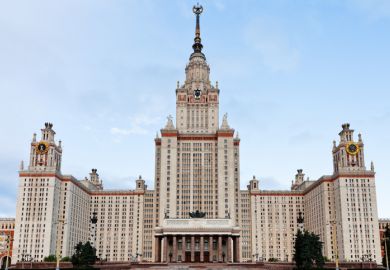Iryna Volnytska was on her way back from a holiday in Ecuador when Russia invaded Ukraine. Stuck at the airport in Miami, her American friends urged her to abandon SET University, the private technology institution she’d helped to launch in Kyiv just two months earlier. Before she became president of SET, Ms Volnytska spent a decade in the corporate sector, building an extensive network in the deep tech field. “They were telling me, ‘Iryna, stay in the US. Move to Silicon Valley,’” she told Times Higher Education.
Instead, Ms Volnytska returned to Ukraine. SET – which stands for Science, Entrepreneurship, Technology – was established by entrepreneur Serhiy Tokarev and the Kyiv School of Economics with the goal of “changing the technological ecosystem of Ukraine”, according to its website. For Ms Volnytska, who was recruited to help set up the university before ultimately becoming its leader, it felt like a calling. “Before SET University, I was super successful, but I wasn’t happy at all,” she said. “I realised it wasn’t what I wanted to do. I wanted to do something more mission-driven.”
Before the invasion, Ukraine’s IT sector was expanding rapidly: in 2021, its exports were valued at $6.8 billion (£5.4 billion), according to the IT Ukraine Association. Even as war shrank the country’s economy, the sector continued to thrive – but the predominance of outsourcing meant, Ms Volnystka said, that “added value stays outside of Ukraine”. SET was established to “teach technology but also how to transform technology into business”.
Originally, Ms Volnytska intended to launch bachelor’s and master’s programmes from the university’s inception, but war forced SET to pivot. “It was clear for me that it was not just a physical war, but also a digital war, so Ukraine would be on the front line of cybersecurity development,” she explained. As unemployment soared, the university launched a short course in cybersecurity, receiving 5,000 applications in two weeks. “We brought on 350 students in the first months of the war and helped them to find jobs,” she said.
The university has also run short courses for women, focused on building businesses in IT, as men continue to be conscripted. “A lot of the workforce are in the army, so we have a lot of potential in women,” said Ms Volnytska.
Last year, SET launched its first master’s programmes: one in cyberdefence and another in computer science and innovation engineering. The 51 students currently enrolled will not be required to write theses to graduate: instead, they will create startups.
Within two years, Ms Volnytska hopes to launch SET’s first bachelor’s degree, designed in part to encourage some of the six million refugees displaced by the war to return to Ukraine. “The future of technology – the future of any industry – is educated people, and right now we don’t have those people,” she told THE. “We have no one to rebuild the country.”
The bachelor’s degree, she envisions, will be international, with terms spent in countries with high populations of Ukrainians: Germany, Poland and the UK. “Then, for the last semester, we’ll bring them back to Kyiv. We want to show them that we have opportunities in Ukraine. We can help them to launch their startups and attract money.”
The process thus far has not been easy, nor is the path ahead likely to be so. The university has repeatedly butted up against Ukrainian legislation in its battle for accreditation. “We want to launch a blockchain master’s degree, but the Ministry of Education requires us to have five professors who graduated from blockchain degrees. But there are no blockchain degrees,” said Volnytska. “The technology is moving much faster than any bureaucracy in Ukraine.”
Professors have proved difficult to come by in general, with many fleeing the country due to the war or leaving academia for better compensated roles in business. Instead, SET has recruited from industry, hiring alumni of Google, Uber and Tesla. “We teach online in the majority of cases, which gives us the opportunity to have speakers from all over the world,” Ms Volnytska said. “It’s a good thing that everyone wants to help Ukraine. They want to contribute.”
Though there was plenty of goodwill towards SET, Ms Volnytska said, it was difficult to fundraise for a small university as a war raged on, with an estimated 10,000 civilians killed and millions more living in poverty. “You can’t ask for money for the university when you have children with nothing to eat,” she said. “No one is investing in education. It’s a big challenge to explain that education is important; education is our future.”
Still, she said, SET would play a role in that future. “We need to rebuild the country. Do we want to rebuild old school factories, like the ones that were destroyed? No, we want to build it in a smart, technological, innovative way. This is where we need educated people.”
Ms Volnytska’s ultimate ambition, she said, was “to build an innovative hub in Ukraine, to make it a centre of innovation”. She has confidence in SET’s success. “There are innovations by choice, and there are innovations by necessity – and now we don’t have any choice.”
Register to continue
Why register?
- Registration is free and only takes a moment
- Once registered, you can read 3 articles a month
- Sign up for our newsletter
Subscribe
Or subscribe for unlimited access to:
- Unlimited access to news, views, insights & reviews
- Digital editions
- Digital access to THE’s university and college rankings analysis
Already registered or a current subscriber?
















